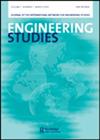The Pride and Joy of Engineering? The Identity Work of Male Working-Class Engineering Students
IF 1.3
3区 工程技术
Q2 EDUCATION, SCIENTIFIC DISCIPLINES
引用次数: 16
Abstract
In this article, we explore the identity work done by four male, working-class students who participate in a Swedish mechanical engineering program, with a focus on their participation in project work. A focus on how individuals negotiate their participation in science and technology disciplines has proven to be a valuable way to study inclusion and exclusion in such disciplines. This is of particular relevance in engineering education where it is widely argued that change is needed in order to attract new groups of students and provide students with knowledge appropriate for the future society. In this study we conceptualized identity as socially and discursively produced, and focus on tracing students’ identity trajectories. The empirical data consists of ethnographic field notes from lectures, video-recordings of project work, semi-structured interviews, and video-diaries recorded by the students. The findings show that even though all four students unproblematically associate with the ‘technicist’ masculinity of their chosen program it takes considerable work to incorporate the project work into their engineering trajectories. Further, ‘laddish’ masculinities re/produced in higher education in engineering also contribute to a ‘troubled’ identity trajectory for one of the interviewed students.工程的骄傲与快乐?工科男生的身份认同工作
在这篇文章中,我们探讨了四名参加瑞典机械工程项目的男性工人阶级学生所做的身份工作,重点是他们对项目工作的参与。事实证明,关注个人如何协商参与科学和技术学科是研究这些学科中的包容和排斥的一种有价值的方式。这在工程教育中尤其重要,人们普遍认为,为了吸引新的学生群体,并为学生提供适合未来社会的知识,需要进行变革。在这项研究中,我们将身份概念化为社会和话语产生的,并重点追踪学生的身份轨迹。实证数据包括讲座的民族志现场笔记、项目工作的视频记录、半结构化访谈和学生录制的视频日记。研究结果表明,尽管所有四名学生都毫无疑问地与他们所选项目的“技术主义者”男性气质联系在一起,但要将项目工作纳入他们的工程轨迹,还需要做大量的工作。此外,在工程高等教育中重新产生的“淑女”男性气质也导致了一名受访学生的“麻烦”身份轨迹。
本文章由计算机程序翻译,如有差异,请以英文原文为准。
求助全文
约1分钟内获得全文
求助全文
来源期刊

Engineering Studies
ENGINEERING, MULTIDISCIPLINARY-HISTORY & PHILOSOPHY OF SCIENCE
CiteScore
3.60
自引率
17.60%
发文量
12
审稿时长
>12 weeks
期刊介绍:
Engineering Studies is an interdisciplinary, international journal devoted to the scholarly study of engineers and engineering. Its mission is threefold:
1. to advance critical analysis in historical, social, cultural, political, philosophical, rhetorical, and organizational studies of engineers and engineering;
2. to help build and serve diverse communities of researchers interested in engineering studies;
3. to link scholarly work in engineering studies with broader discussions and debates about engineering education, research, practice, policy, and representation.
The editors of Engineering Studies are interested in papers that consider the following questions:
• How does this paper enhance critical understanding of engineers or engineering?
• What are the relationships among the technical and nontechnical dimensions of engineering practices, and how do these relationships change over time and from place to place?
 求助内容:
求助内容: 应助结果提醒方式:
应助结果提醒方式:


